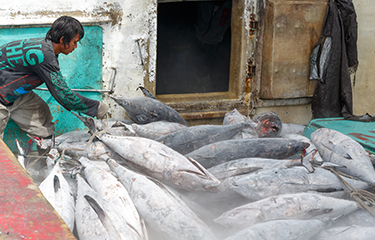Oman and Indonesia have officially notified the Indian Ocean Tuna Commission (IOTC) of their objections to a measure that would reduce the total allowable catch for yellowfin tuna in the Indian Ocean.
The formal objection will mean that Oman and Indonesia will not have to implement the conservation measure.
Abdulaziz Al-Marzouqi, director-general of Oman’s Ministry of Agriculture and Fisheries, Wealth, Development, made the country's protest official in a letter to the IOTC.
Indonesia, in its objection, said the proposed measure would “negatively impact small-scale and artisanal fisheries.” It said the country's government remains committed to sustainability.
Last month, the IOTC agreed to adopt an interim rebuilding plan for yellowfin tuna, which will come into effect on 1 January, 2022. That plan has had its effectiveness called into question after five countries – including India, Indonesia, Iran, Oman, and Madagascar – objected to it during the session.
Iran, India, and Madagascar have not yet formally submitted their objections to the measure.
Indonesia said the proposed use of recalculated data will reduce the country’s catch limit by more than 40 percent.
“The decision on using re-estimated data has strongly urged Indonesia to express our disappointment and compelled Indonesia to take the necessary action by declaring an objection to the adoption of the Interim plan,” Indonesia Ministry of Maritime Affairs and Fisheries Director-General Muhammed Zaini wrote in the country's objection.
The plan – proposed by the Maldives and co-sponsored by Kenya, South Africa, and Comoros – was adopted by the IOTC on the last day of its June session after hours of negotiations.
The Maldivian proposal advocated reducing the catch of yellowfin tuna in the Indian Ocean by at least 15 percent compared to 2015 catch levels, corresponding to a total of 346,438 metric tons.
According to a statement from the Maldives Ministry of Fisheries, Marine Resources, and Agriculture after the IOTC meeting on 14 June, the health of regional tuna stocks is crucial to the livelihood of its coastal fishers.
“Sustainability of tuna stocks in the Indian Ocean is vital for coastal states, in particular, small-island developing states such as the Maldives,” the statement reads. “The Maldives relies heavily on tuna stocks for food security, jobs, livelihood opportunities, and thus the sustainability of these tuna stocks is key to the survival of the Maldivian people and our way of life.”
Photo courtesy of Uwe Aranas/Shutterstock







